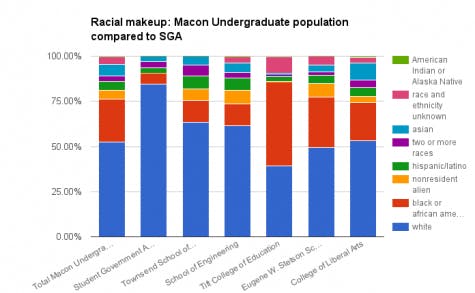Simeon Cullens is a rising junior at Mercer University. He’s black. He’s a member of a fraternity. He will be a Senator at Large in the fall, and if freshmen don’t elect more diverse class officers next semester, he will be the only black senator in the Student Government Association.
In a recent survey conducted by The Cluster, students on SGA — including both senators and members of the executive board — reported information such as their position on SGA, their affiliation with Greek organizations, and their race and ethnicity.
According to that survey, the racial makeup of SGA isn’t an accurate portrayal of the university’s undergraduate students on the Macon campus. Mercer’s Office of Institutional Effectiveness publishes basic demographics for the different schools at Mercer every fall in a series of tables that anyone can find online.
Comparing this data with that of the survey shows that black students are particularly underrepresented in SGA.

And this isn’t a new trend. While Cullens wasn’t the only black person on senate this past year — he was joined by Jesus Robinson in the fall and Christopher Murdock served all year long — three out of 32 is still only around nine percent. That’s way off from the 24 percent of black undergraduate students on the Macon campus.
Cullens said in a Facebook message that in past semesters on SGA, he’s been deeply aware of how he is representing the black population of students.
“I have a different perspective than anyone on SGA because the people I am around on a daily basis have different interests and concern[s] than those that are already represented in senate,” he said. “Most people in SGA have the same social groups or friends on campus which in my eyes prohibits SGA reaching all realms of campus.”
Cullens said that he works to try to close the disparity. Sometimes it works. Sometimes it doesn’t.
“(Organizations) such as NPHC or LASO aren't pushed,” he said. “They are mentioned, but you never see an SGA representative there besides a select few senators and myself.”

He isn’t the only one who recognizes a disparity exists. Austin Harrison, the SGA president for the 2015-2016 school year, said that while diversity is one strength of Mercer as a whole, it often doesn’t translate to the senate.
“I have always felt that one of SGA’s biggest weaknesses has been our lack of diverse representation,” Harrison said. “With that said . . . I am a firm believer that mindset and mission can overcome demographic limitations. It has been my personal goal, and the goal of many other senators, to engage in productive dialogue with all students regardless of gender, race or Greek affiliation.” [pullquote speaker="Austin Harrison" photo="" align="right" background="on" border="all" shadow="on"]“I have always felt that one of SGA’s biggest weaknesses has been our lack of diverse representation,”[/pullquote]
SGA has taken measures this year to try to reach out more to students. There is a new Campus Engagement Committee that seeks to include students who may not always be heard in senate.
“The committee was created to make SGA more accessible to all students, to remove the stigma that you have to be outgoing or Greek to be elected, and to make sure all of our activities and services are inclusive of every student,” said Aaron Scherf, the chairman of the Campus Engagement Committee and vice president of SGA for the upcoming school year, in an email. “It is only a start, but it is my hope that promoting common understanding and interaction between the diverse groups and diverse students on campus will be a priority for SGA for years to come.”
Bear Forums, which are open to everyone on campus, are marketed as a place where everyone can come and share their concerns. In an added measure, there have been Coffee on Cruz events where senators make themselves available to hear concerns and answer questions.
Harrison said that there is “still more we as SGA could do as a representative body.”
Cullens said that it’s not just about reaching out to those students, but bringing them into SGA to become a part of the process.
Scherf agreed.
“If we do not have enough input from students on an issue, we are left to make the best decision we can with what we have,” Scherf said. “That is when having a diverse and representative senate body becomes so important, so that we can look at issues from every angle, and consider how it may affect students of differing ethnicity, differing cultural and religious backgrounds, differing sexual orientations, differing gender identities, and differing majors.”
But bringing those students to the table isn’t an easy process.
“I really push for more minority [sic] to run for SGA, but they never seem to get elected,” Cullens said.[pullquote speaker="Desirrae Jones" photo="" align="left" background="on" border="all" shadow="on"]As of now, there are no women of color (WoC) on SGA next year. How are those voices going to be heard? [/pullquote]
For example, this spring, a rising senior ran for SGA. She’s been involved with everything from athletics to admissions on campus. She’s the president of Young Democrats. She’s black.
And she wasn’t elected.
Her name is Desirrae Jones.
“[SGA] is not an adequate representation of campus at all. Mercer is a very diverse place, but the ‘representative body’ of the students does not reflect that,” Jones said in an email. “As of now, there are no women of color (WoC) on SGA next year. How are those voices going to be heard? I applied for a position as a member of the executive board, and I didn't even get an interview.”
She said that people like her aren’t even applying or running for those positions because they don’t see a point.
“We don't win,” she said.
She said that the same attitude seeps into voter turnout.
“It is going to be a group of popular, mainly white, people that are overly-involved. Why vote if those are the only people running?” Jones asked.
SGA struggles to reflect student body’s diversity

SGA has plans for the year ahead. Photo by Jenna Eason.
These numbers were compiled using statistics from the Mercer University Office of Institutional Effectiveness 2015 Demographic Profiles and from a recent survey of SGA by the Cluster. Five members of SGA failed to complete the survey. Their results have been projected. Each bar shows a breakdown of race within the undergraduate level of those schools and SGA. The “Total” bar was calculated by adding up counts from the undergraduate levels of each school and translating that into a total percentage for the Macon Undergraduate population.




